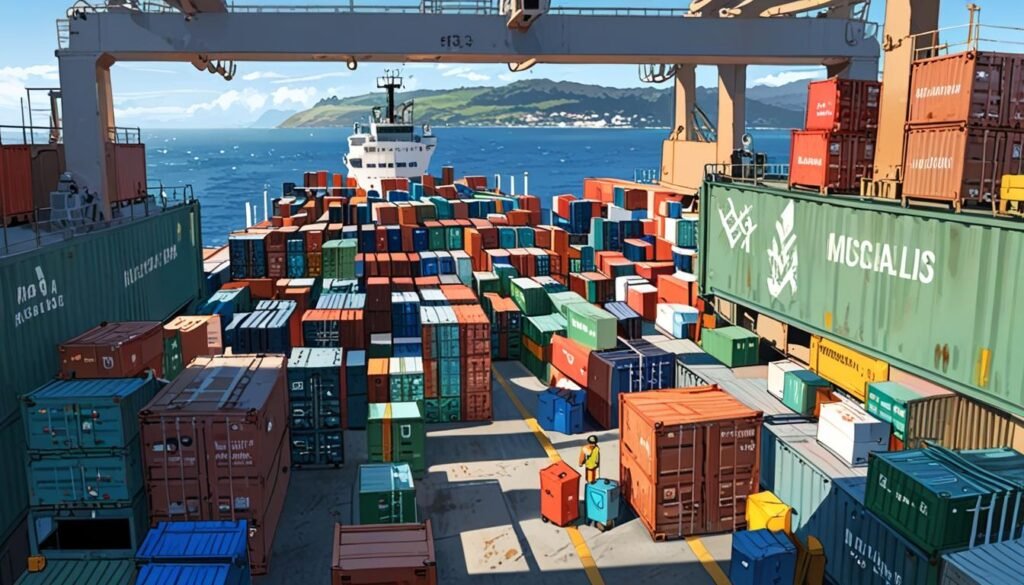**London**: Recent errors in shipping documentation have caused Norfolk Island and other Australian territories to be imposed tariffs, highlighting the importance of clear data in global trade. Mislabelled exports reveal systemic issues in data management that impact trade statistics and economic outcomes.
The implementation of Artificial Intelligence (AI) within businesses has garnered widespread attention and interest, yet the internal requirements necessary for these technologies to function effectively often receive less scrutiny. Among these requirements, the significance of maintaining clean data is paramount, as poorly managed data can lead to significant inaccuracies, encapsulated in the adage ‘garbage in, garbage out’ (GIGO).
One of the most prominent examples illustrating the repercussions of inadequate data management emerged recently with the US government’s application of increased import tariffs. Notably, the list of countries affected included Norfolk Island, situated 1,600 km north-east of Sydney, along with the Antarctic territories of Heard Island and the McDonald Islands. These regions are Australian territories, with Norfolk Island heavily reliant on tourism and the Antarctic islands uninhabited by humans—only populated by penguins. The question arises: why were these territories subjected to import tariffs?
The Guardian provided insight into this situation, revealing that the root of the issue lay in mislabelled shipping documents. An inherent challenge in international trade, shipping document errors are not uncommon. In this case, multiple shipments were misclassified as originating from Norfolk Island or Heard and McDonald Islands, despite no relevant exporting companies or ports being present in these territories.
Further investigation revealed that, according to US government data, Norfolk Island exported goods worth US$655,000 to the US in 2023, primarily leather footwear. However, as identified by The Guardian, two bills of lading implicated in this scenario incorrectly attributed the shipments—consisting of 3,714 Timberland men’s black ankle boots—to Norfolk Island, when they were actually dispatched from the Bahamas to the port of Miami, Florida. These documents erroneously referenced Timberland’s registered address in Norfolk Island rather than the accurate address located in New Hampshire.
Misclassifications extended beyond this incident, involving additional shipping documentation that listed Norfolk Island as the country of origin for various goods, including shipments from an aquarium company based in Norfolk, UK, and steel equipment sent from Novum Structures also based in Norfolk, UK.
Similarly, Heard Island and McDonald Islands were erroneously reported as exporting products worth approximately US$1.4 million in 2022, mainly machinery and electrical goods. As detailed by The Guardian, numerous bills of lading illustrated that these supposed exports were primarily steel or plastic goods sent from European countries to the US.
Other territories have experienced similar mislabelling issues. Tokelau, a territory of New Zealand, saw a shipment of pergola parts incorrectly listed as originating from Tokelau when they were shipped from Turkey to the US. Additionally, bills of lading for shipments from India to the US inaccurately cited the ‘British Indian Ocean Territory’ as the origin, despite its remote status and limited population.
The inaccuracies in these shipping records subsequently affected the US census and trade data systems used to determine the import tariffs. The US Census Bureau, which oversees the collation of trade statistics, acknowledges the potential impact of reporting errors on commodity statistics in its guidelines.
The origin of these errors remains unclear; however, it is believed they arose from human transcription mistakes during data entry from various documents. These common discrepancies highlight the challenges faced across global supply chains, where the term ‘normalisation’ is employed to describe the process of reconciling inconsistencies in data for analytical purposes.
Supply chain professionals are alerted to the necessity of exercising caution when utilising ‘outside-in’ data to enhance accuracy. Despite decades of emphasis on data precision in business systems since the advent of Material Requirements Planning (MRP) systems, the importance of meticulous data management continues to be overlooked in various implementations.
As the complexities of supply chains expand beyond internal processes to external data sources, the risk of errors increases. An ongoing measurement regime aimed at ensuring data accuracy, along with standardisation of documentation and barcoding processes, is advised to mitigate discrepancies and bolster the efficacy of external data applications in operational planning.
This recent incident underscores the critical nature of data integrity within the global trade landscape and the vital role clear, accurate information plays in shaping business outcomes.
Source: Noah Wire Services

